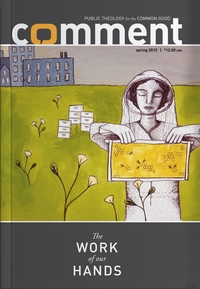Really good stuff in the latest issue of Comment, called “The Work of Our Hands,” on the conversations we’re not having about how blue-collar work, menial work, and disgusting work fit into God’s design. Or don’t fit. H ere’s what Brian Dijkema has to say in his introductory letter:
ere’s what Brian Dijkema has to say in his introductory letter:
There is a swath of the evangelical community to whom the “faith and work” conversation is a revelation: “What?! You mean my work can be a calling just like my pastor’s?” There is something wholesome about this excitement. It’s great to see people discover that the work of their daily lives has meaning and significance in the eyes of God. This excitement has occasioned an explosion of books and centers and conferences that aim to get the word out: Your cultural labour matters to God.
But the zeal for connecting faith and work faces two temptations. On the one hand, our Genesis 1 focus on the goodness of work risks downplaying the Genesis 3 side of work: that work is experienced by many as a kind of toil. On the other hand, the current conversations tend to celebrate work that is du jour and “professional.”
So we fall into the trap of taking Andy Crouch’s Culture Making and equating it with a baptized version of Richard Florida’s “creative class.” We get excited about those who open local coffee shops or become journalists or start a non-profit or (fill in the blank). But what do our “faith and work” books have to say to people who work on the line at a Ford assembly plant, or to medical assistants who take care of the elderly? Will landscapers and receptionists see themselves in the “work” we’re talking about? Would anyone who has to wear coveralls to work feel comfortable at our “faith and work” conferences?
And even when we bring skilled labour—or the completely different category of menial labour—into the faith and work conversation, we sometimes focus on the parts of those jobs that fit with creativity and fulfillment. It’s nice to say “it’s so good that you care for our elderly,” but it’s much harder to talk about having to change colostomy bags, or how you smell when you’re done cleaning out a chicken barn. Yet this work takes the waking hours of many people—perhaps even the majority—in North America and certainly the world. Leaving this work out of the conversation not only leaves too many on the outside, but unwittingly communicates a certain hopelessness, as if joy and satisfaction—indeed the LORD’s satisfaction—cannot be found in this type of work.
Convicting stuff. The issue attempts to take drudgery and toil seriously and raises the questions as to whether “meaning” ought to be what we’re looking for and whether some kinds of work just aren’t, and can never be, Kingdom work despite their being done by Kingdom workers.
If you subscribe by Saturday, Feb. 28 you can start your subscription with this issue. I’d highly recommend it. And you can read more about this conversation in these posts on MISSION:WORK, too:
- What does faith and work mean to blue-collar workers?
- “Is this not Joseph’s son, the blue-collar worker?”
- Does blue-collar work have any meaning?
- Unfulfilling work as vocation
- Which is a higher calling: building churches or building fences?
- The craftsman and her environment
- Greed is just another word for fear












